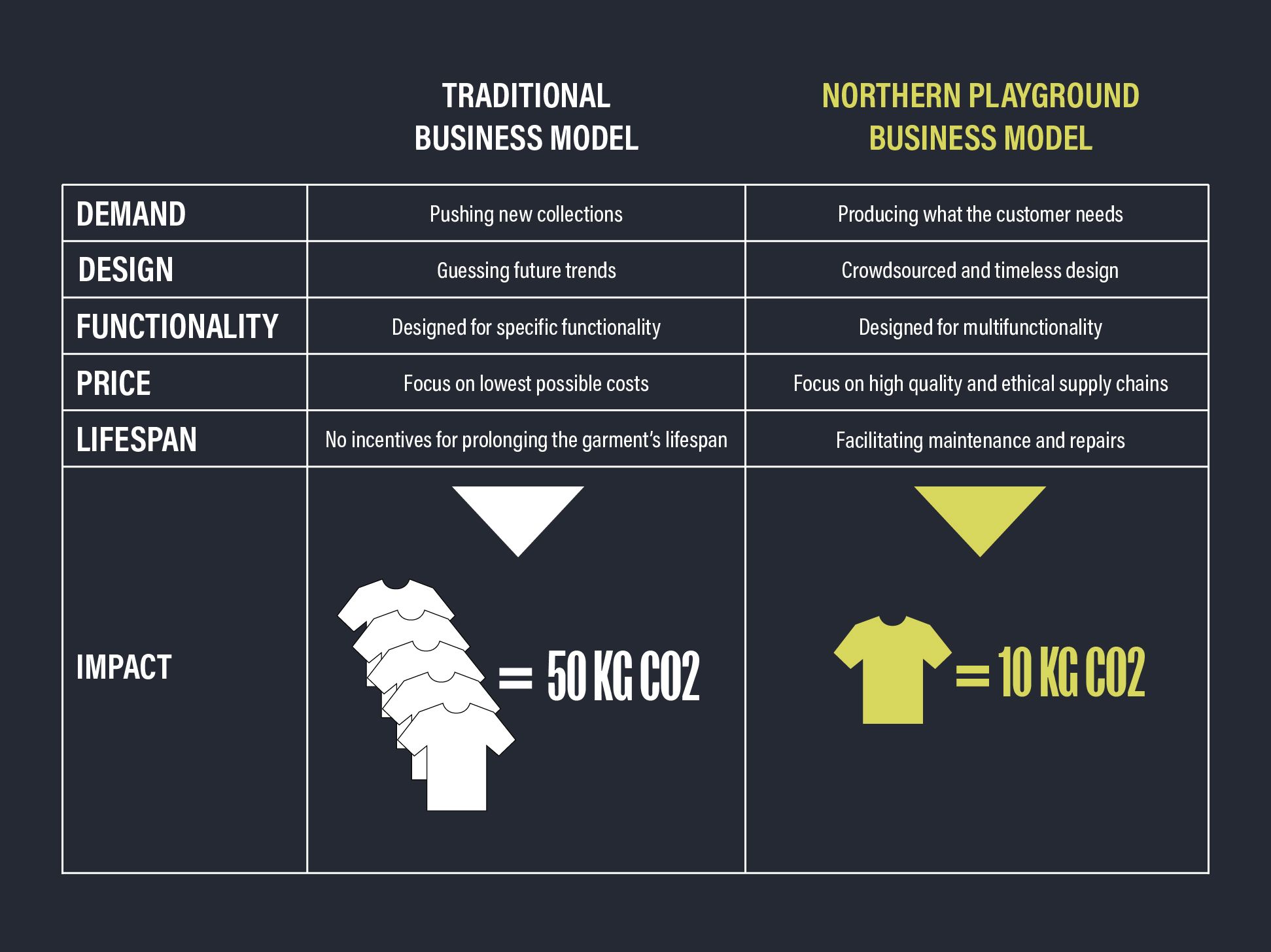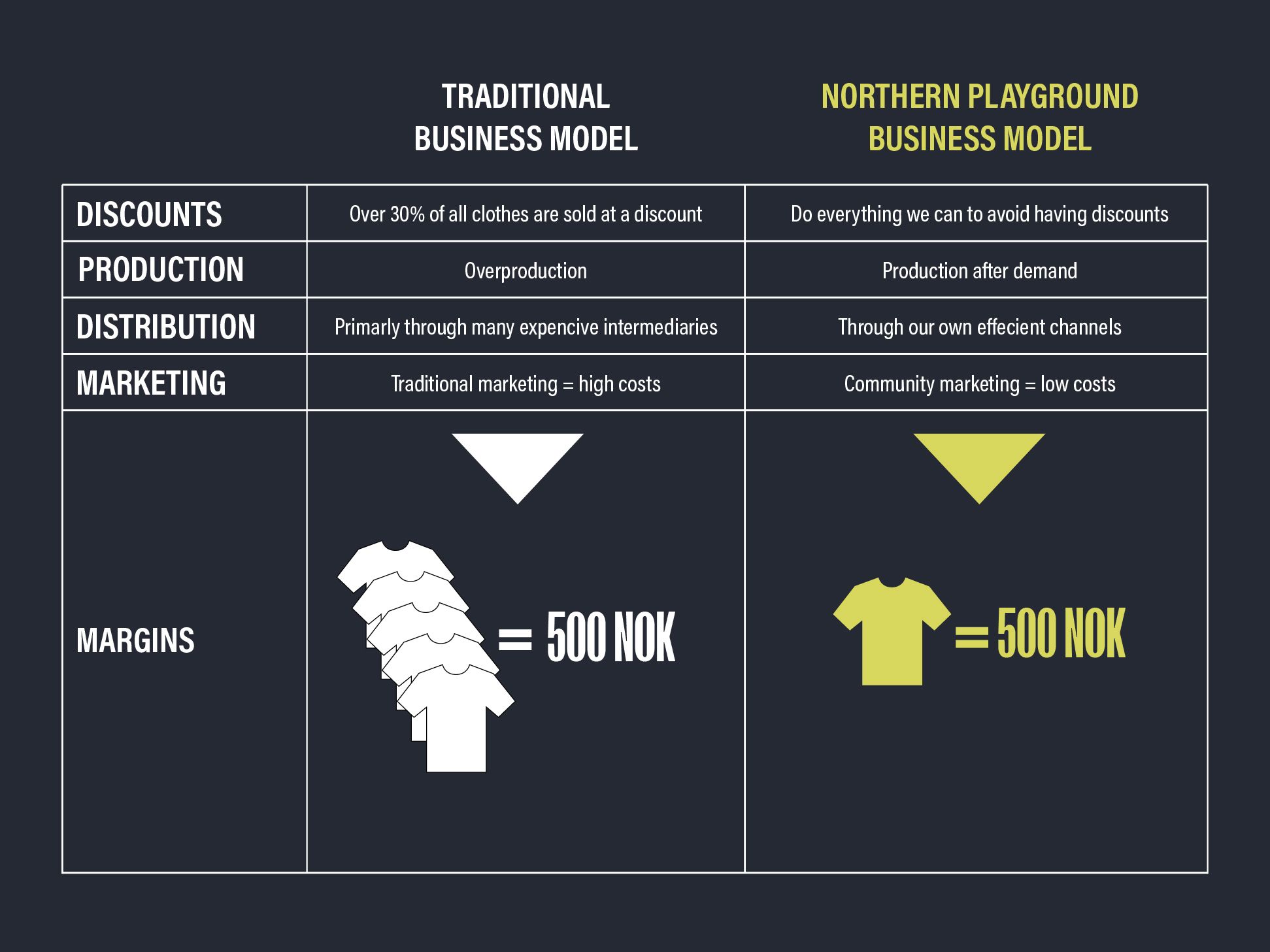THE SOLUTION
It didn't take many years after starting Northern Playground before we realized how terrible the textile industry is. We had to make a choice: Either shut down for good or make a radical change to our business model. We chose the latter, and decided to make som changes that would really mean something.
The interest in habit change is larger than ever. The timing to spread our vision to the masses is very good. We also have a solid advantage; We are already far ahead of the rest of the industry when it comes to creating true sustainability.

WHAT WE KNOW
80% want more products that can be repaired.
60% want to buy less and wear what they own longer.
45% would switch out their favorite brand for a more sustainable option.
90% don't know how to choose sustainable clothes.
(Kantar Global Sustainability index 2022), (Opinion Forbruker og Bærekraft 2022)
Our mission is to reduce clothing consumption. At the same time, our livelihood comes from selling clothes. This is an obvious paradox, but our business model makes it possible.
REDUCING CONSUMPTION
The only truly sustainable solution in the clothing industry is to consume, and therefore produce, less. We have taken multiple steps towards reducing consumption:
- Community: We let our customers connect with our clothes by letting them take part in the design process, and help decide if products deserve to be sent to production.
- Fair prices: We don't focus on achieving the lowest possible price when we design our clothes, but instead focus on creating the best possible garment. This also gives us economic room for good animal welfare, working conditions and environmental measures.
- Classic design: With simple designs and classic colors, you can wear our clothes in any situation, and avoid buying different garments for different activities.
- Use More +: All NP products are sold with Use More +. This means that we prolong the life of all garments by helping our customers with maintenance and repairs, as long as possible.
- No collections: You will pretty much always be able to find the same garments in our assortment. We will also never tell you that it's time to switch out the t-shirt you bought last year with a new one.
REMOVING ECONOMIC WASTE
The textile industry is dependant on pushing enormous volumes to make money. This is because of things like discounts, overproduction, expensive intermediaries, and expensive marketing. We do the exact opposite.
By removing economic waste, we are creating much better margins:
SOCIAL RESPONSIBILITY
In addition to our vision of reducing consumption, we strive to be a positive factor in our society in multiple different areas:
- Political influence: We work politically to make more space for the environment in the business community.
- Self imposed environmental tax: For every sale, we pay a self imposed tax of 15 NOK that goes to saving and repairing clothes from other brands.
- European production: Most of our clothes are produced at Utenos in Lithuania, which is the first manufacturer in the world that complies with all of Greenpeace's environmental standards
- Local production: We make certain products in Norway, and are always on the lookout for new possibilities within local production. The film below about our Made in Tøyen concept shows the vision behind our local production.
- Personal impact: All employees also take their personal environmental impact seriously. For example, no employees drive to work, and we all agree on eating meat-free lunches
- Packaging: We continuously work to find the best solution to protect and transport our goods while also taking care of the environment. Today, we use plastic packaging made of 70% recycled plastic and 30% virgin plastic. We will always choose packaging that has a real impact on the footprint instead of using materials with perceived sustainability by customers. Currently, we are part of a project led by NF&TA with the aim of finding the best packaging solution for Norwegian brands.
- Higher margins per garment also give us the economic opportunity to ensure better animal welfare, better working conditions and stricter environmental requirements throughout the entire supply chain


